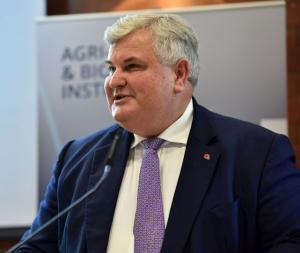Farmers and food producers urged to “embrace change” at George Scott Robertson Memorial Lecture
Date published:
Food retail around the British Isles was facing “severe headwinds” according to former Waitrose supermarket MD Lord Mark Price, who delivered the George Scott Robertson Memorial Lecture at Riddel Hall, Queen’s University Belfast recently.

Lord Price, who was between 2016-2017 a UK Minister of State for Trade after a long career in business, said costs were rising sharply for food retailers, but the biggest single threat was online shopping which, despite being only 6% of the British market, was set to grow quickly.
“We are still in the foothills of what can happen with an aggressive Amazon food-offer entering the market,” he commented, in a keynote address entitled UK Food Systems: Adapting to Change.
Lord Price was delivering the 61st George Scott Robertson Memorial Lecture – an annual event hosted by the Agri-Food and Biosciences Institute (AFBI); the Institute for Global Food Security (IGFS) at Queen’s University; the NI Department of Agriculture, Environment and Rural Affairs (DAERA) and the Ulster Farmers’ Union (UFU). Dr George Scott Robertson played a prominent part in promoting agricultural progress in Northern Ireland in the first half of the 20th century.

In a well-received lecture, he told a capacity audience including many farmers that primary producers were also facing tough challenges – global competition, fewer subsidies, rising costs, but with one big potential opportunity: more export markets.
The most likely Brexit outcome, in his view, was a free-trade agreement with the EU, with regulatory alignment in sectors where it “made sense”, such as agrifood in Ireland. Unfettered by membership of an EU customs union, the UK would be free to create other trade agreements around the world and to compete on the global stage.
None of this suggested an easy environment for farmers in the short-term, he conceded. “Your competitor will no longer be the farm next door or even in a neighbouring county – it will be a farmer in Mexico or New Zealand”.
But farmers needed to embrace change and could learn lessons from retailers. In recent years, retailers had to quickly become “more efficient and more differentiated” and, he said, embrace new models, particularly digital ones.
Collective buying and selling for farmers were key requirements for the future, he said, and organisations such as the UFU would play a “vital role” in galvanising members to look at new ways of doing things and deciding on key questions affecting their members.
“How important is food security over free-market liberalism?” he asked. “How do standards and regulation protect, increase differentiation or lead to extra bureaucracy and cost? To what extend should the government lead on investment in research, technology and science?
“How do we acknowledge and reward the public service which farmers provide in protecting and preserving the countryside? How do we maintain the vitality of country communities?”
One thing was for sure, Lord Price continued in his concluding remarks - everything we thought we knew was about to change. There was “no time to waste” in developing a “globally minded approach” for food producing and trading going forward.
Other speakers at the event were Dr Elizabeth Magowan (AFBI); Professor Nigel Scollan (IGFS); Dr Denis McMahon (DAERA); and Ivor Ferguson (UFU).
Notes to editors:
AFBI carries out high quality technology research and development, statutory, analytical, and diagnostic testing functions for DAERA and other Government departments, public bodies and commercial companies.AFBI's Vision is “Advancing the Local and Global Agri-Food Sectors Through Scientific Excellence”.AFBI's core areas: - Leading improvements in the agri food industry; - Protecting animal, plant and human health; - Enhancing the natural and marine environment.All media enquiries to AFBI Press Office